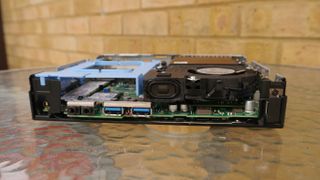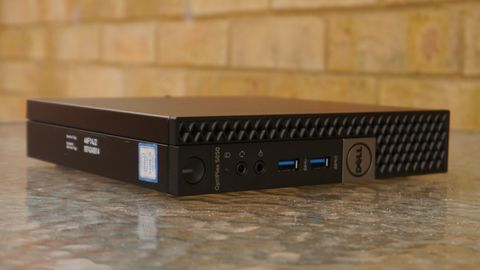Why you can trust TechRadar
In use
Doubtless it’s no surprise to learn that this is a powerful and capable device, but its performance is slightly hampered by the lack of dual-channel memory.
The OptiPlex scored highly on the 10 test benchmarks we ran, thanks to a combination of a high core count and high base clock speed, something that laptop processors don’t usually offer due to power constraints.
Its four cores manage to deliver the sort of firepower that only desktops can offer within a set power envelope and budget.

The graphics subsystem isn’t too shabby as well, which means that you will be able to play fairly recent games at decent enough frame rates.
Driver, BIOS and firmware updates are also made easier thanks to the bundled Dell Command Suite which allows for flexible and automated system management.
Dell offers deployment options at checkout which include imaging, BIOS settings, asset tags and asset reports at its most basic, adding 24/7 onsite migration, data migration and 30-day post-deployment support and training credits with the premium tiers.

Final verdict
The competition in the world of enterprise micro PCs consists of the Lenovo ThinkCentre M710q, the Fujitsu Desktop Esprimo D556/E90+, the Acer Veriton N4640G and the HP ProDesk Mini 400 G3. All four have fairly similar configurations and care packages but the HP is the cheapest of the lot.
The Dell OptiPlex 5050 remains quite a capable desktop, but even considering that it carries a three-year next business day delivery, it comes at a steep price. The outlay is higher than a mid-range laptop like the Dell Latitude 3380, which swaps the more powerful CPU and extra ports for an integrated battery and a Full HD display.
That said, we love how compact and powerful this PC is, and we suspect that Dell could go even smaller by providing a totally enclosed, non-serviceable chassis similar to the Voyo V3 Mini PC.
This could make servicing easier (you just need to swap them out) and reduce the number of SKUs – but on the other hand, it would reduce flexibility when it comes to SKUs and eliminate any expansion space.
- We’ve picked out the best business PCs of 2017

Désiré has been musing and writing about technology during a career spanning four decades. He dabbled in website builders and web hosting when DHTML and frames were in vogue and started narrating about the impact of technology on society just before the start of the Y2K hysteria at the turn of the last millennium.

Is there a moral imperative for businesses to share data?

Why sovereign AI infrastructure is driving worldwide adoption of Generative AI

Real life 6G speed tests revealed by Japanese tech giants — 100Gb/s transmissions could become the norm for mainstream wireless network data transfer within a few years
